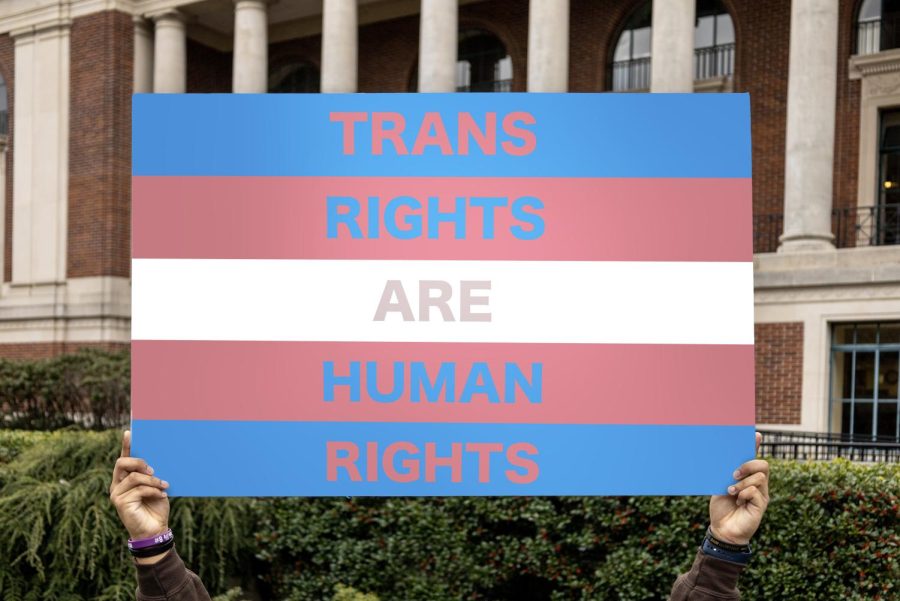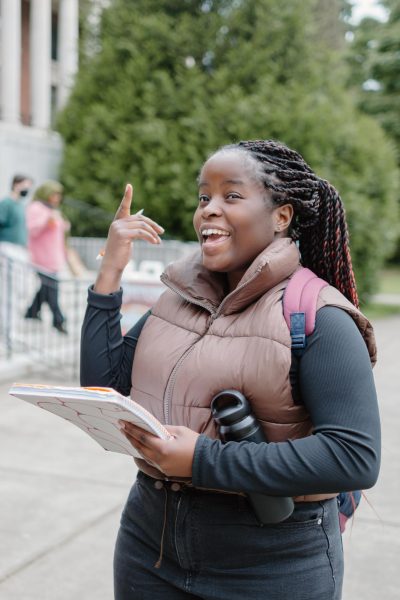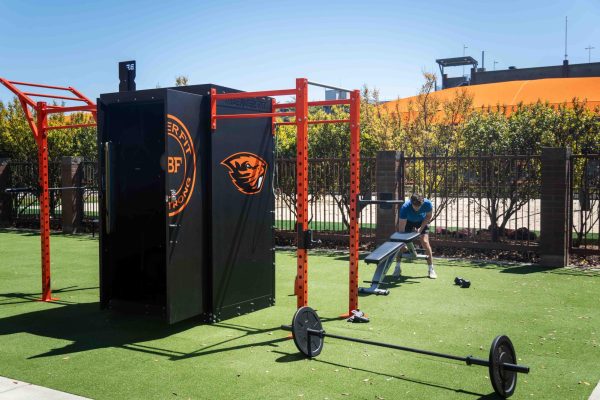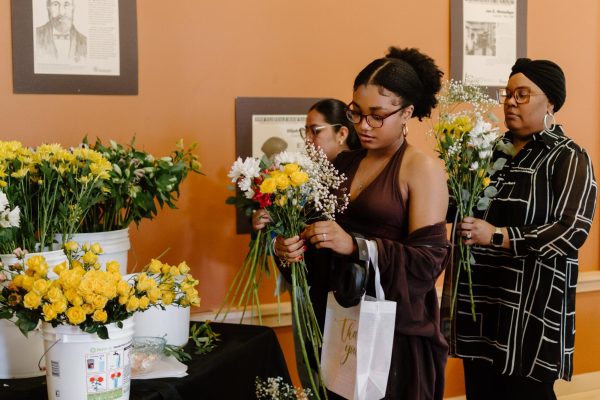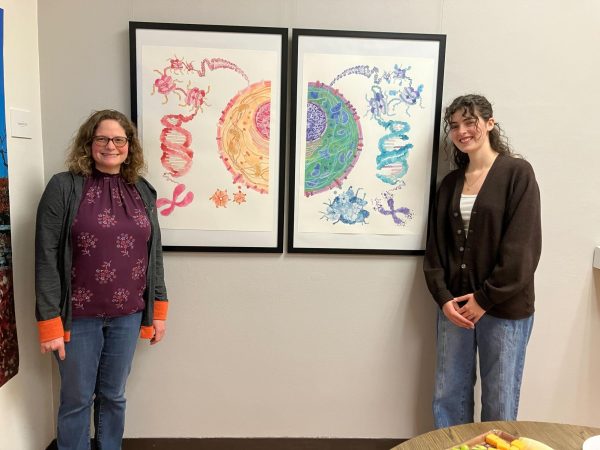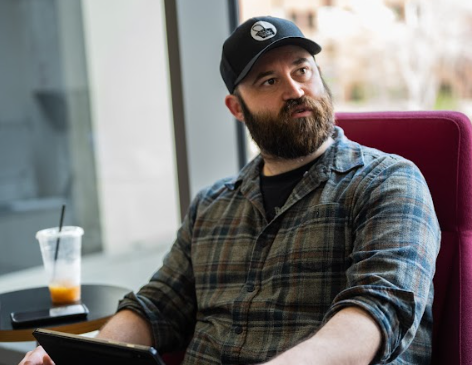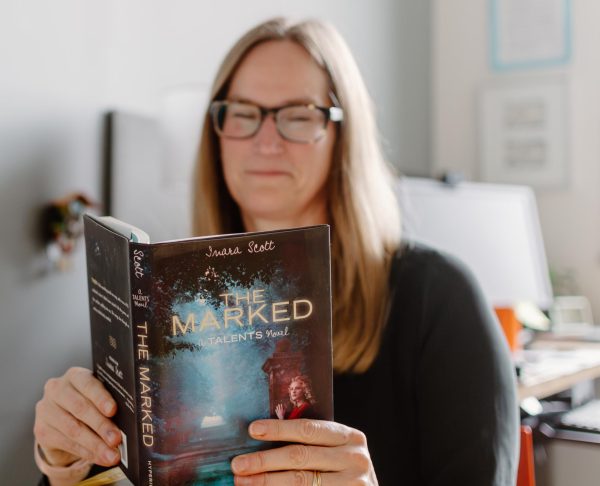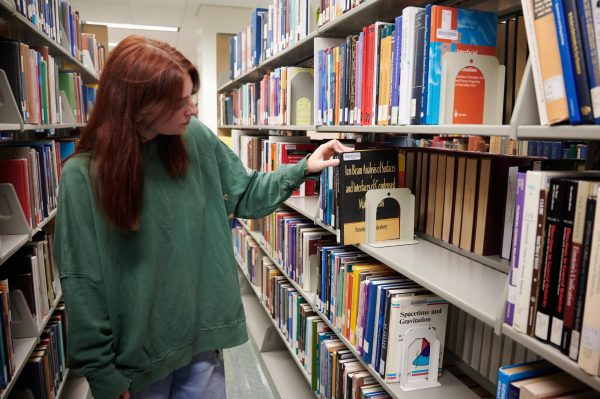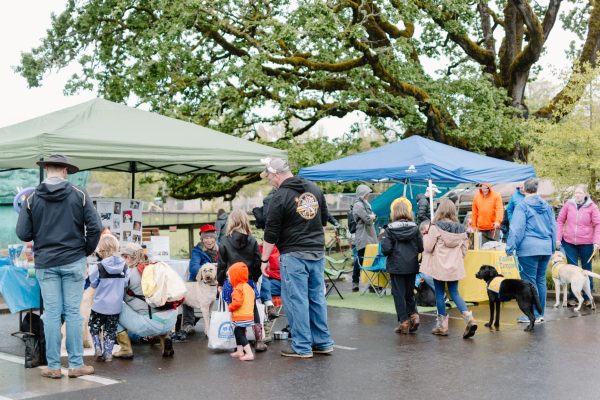Transform! and Transsisters, integral OSU support groups for trans folx, continue next term
In discussion with group hosts Beth Zimmermann and Rae Sidlauskas
A photo illustration of a trans rights sign in front of the Memorial Union on March 9. Transform! and Transsisters will continue to meet weekly throughout spring term.
“The work we do is not in a silo… None of the life lived at OSU is done in isolation.”
Beth Zimmermann (speaker of the lovely quote above) and Rae Sidlauskas (superstar queer advocate), hosts of Transform! and Transsisters, respectively, will be hosting two support groups throughout spring term starting week two. These two spaces are drop-in support groups that value inclusivity and confidentiality.
Transform! meets Mondays, from 3-4:30 p.m. at Counseling & Psychological Services on the fifth floor of Snell Hall. Transsisters meets on Tuesdays, from 3-4:30 p.m. on the fifth floor of Snell, as well.
Who is Beth Zimmermann? (she/her/hers)
Zimmermann provides direct clinical services: individual, relational and group, and is a member of the LGBTQ+ community. She’s been working at the Counseling and Psychological Services on Oregon State’s campus since 2007, and has been working with the trans and queer community throughout her entire career.
The first time she facilitated a support group for trans folks was in 2004. In addition, she specializes in working with people about grief and loss. The best way to describe her orientation as a counselor is a feminist with a focus on generalist ideals.
“As a feminist, I do my best to level the power in our relationships,” Zimmermann said. “I think that’s one of the reasons I’ve worked across my career to lessen… barriers to care for folx. That’s one of the reasons why I do drop-in support groups. Because it is hard to come into a new space or experience especially when you’re exploring something that feels very precious and tender like gender identity (and) sexual orientation… Honor and validate the normalcy of (exploring gender identity and sexual orientation): the validity of the research in exploration. And that they’re not alone. Sometimes we get stuck feeling very alone in this world.”
Zimmermann began her career as a K-12 educator. In that time during the 1980s and ’90s, she wasn’t able to be out as gay or gender-queer because of the pressure in her school district to fit the mold. If she had been publicly out as an educator she would have been immediately fired and stripped of her license.
Now, she feels very supported on campus.
Since OSU has returned to in-person learning, her support group Transform! has been flourishing.
In order to attend, simply check in at the front desk with no prior preparation and join the group for as long as you’d like. The group ranges from eight to 12 in attendance. Zimmermann said she is proud and feels privileged to be a part of this generation’s journey moving through the fluidity of gender and sexuality.
Zimmerman further elaborated on the work both she and Sidlauskas do “is not a silo… None of the life lived at OSU is done in isolation.”
They work with the Pride Center, SOL (the QTPOC community on campus), Student Health Services, The Career Development Center, the Basic Needs Center, CAPS and the Division of Student Affairs.
Lastly, Zimmerman highlighted the Name-in Use policy for people who need to change their name as it’s recognized by OSU. She mentioned that it has a couple of glitches, but is really great overall.
Who is Rae Sidlauskas? (she/her/hers)
Sidlauskas has been working at Oregon State for two years. She facilitates staff counseling: individual, relational and group too.
There was a request that came from the Pride Center on campus to Zimmermann, who then reached out to Sidlauskas about the need for a support group specifically centered around the experiences of trans womxn and trans-feminine folx.
Sidlauskas stepped up and started Transsisters just last term. She doesn’t consider herself a part of the LGBTQ+ community, but she greatly values stepping up for people who are marginalized.
When Sidlauskas was growing up her dad – who was a pastor at the time – spoke to her about the church needing to be more progressive in their views toward gender and sexuality. Sidlauskas said she values understanding where someone has come from, including the privilege that she carries. She has watched people close to her blossom into their most authentic selves outside of the cisgendered norms.
Sidlauskas spoke at length about men being seen as the default in our society, and what that means for trans womxn.
“For folx who were assigned male at birth who are working within this exploration of femininity… there is the oppression that comes from being trans, then there is this whole new experience of sexism… Obviously we’ve made great strides, but we’re not there yet.”
She spoke further about fashion and gender expression, noting that, “Jeans and t-shirts are default attire… If I were to show up somewhere in jeans in a t-shirt, no one is going to ask, ‘Oh, are you trans?’ Someone assigned male at birth who’s wearing a skirt – all of a sudden it’s this huge (thing).”
Transsisters has been running for two terms now including winter term 2023. They usually see about three people in attendance every week. Within her sessions, when she does check-ins, it’s all about what you can give. Sidlauskas usually asks if you can check in with a sound, a word or a movement (going back to her high school drama days). You share as much or as little as you like.
- Beavers Digest
- Beavers Digest / Culture
- Beavers Digest / Culture / Community
- Beavers Digest / Culture / Expression
- Beavers Digest / Culture / People
- Beavers Digest / Entertainment
- Beavers Digest / Entertainment / Events
- Beavers Digest / Experience
- Beavers Digest / Experience / Campus
- Beavers Digest / Experience / Wellness


